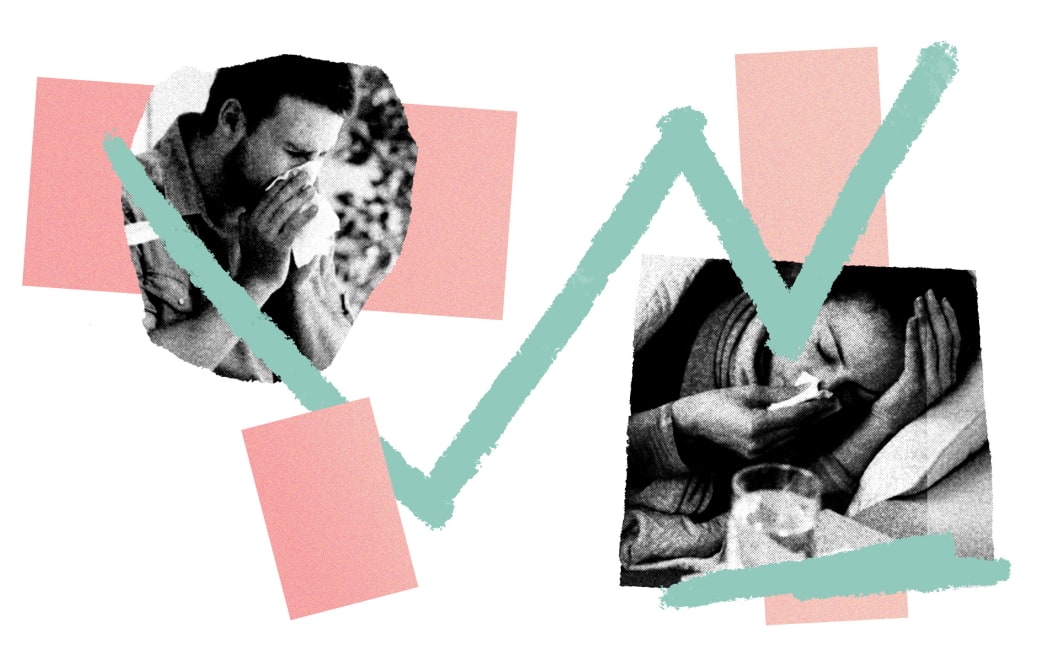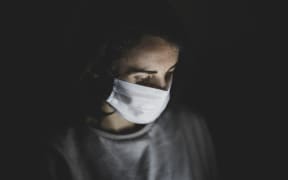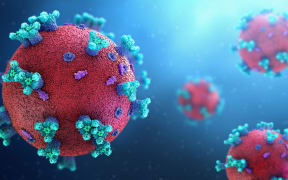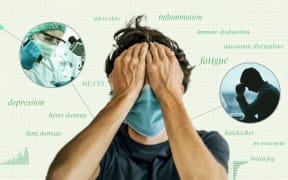
Breathlessness has been a common long Covid symptom throughout the pandemic, but its underlying cause may have changed with variants. Photo: 123rf.com / Composite Image - RNZ
By ABC science reporter Belinda Smith
Since the first Covid "long haulers" were reported in 2020, millions of people have experienced Long Covid.
While Long Covid has no strict definition, it's generally used to describe an illness following a SARS-CoV-2 infection with symptoms that last at least two to three months.
It can manifest as a whole suite of symptoms ranging from body aches and pains to brain fog, and these can substantially vary between people, says Lou Irving, respiratory physician and head of the Royal Melbourne Hospital's post-Covid clinic.
"We now have … over 600 cases and they really help us understand that there's a wide range of presentations."
But under that broad "long Covid" umbrella, clusters of symptoms have emerged, and as the pandemic's worn on, those symptoms have shifted.
Senior respiratory physiotherapist Janet Bondarenko has been working in Melbourne's Alfred Hospital post-Covid clinic since its doors opened two years ago.
Early on, most people referred to the post-Covid clinic had been severely sick and many hospitalised.
"We saw a lot of breathlessness in people, and they could only manage walking a few metres at a time," Bondarenko says.
And while she still sees these symptoms in patients now, she also sees more people with heart-related symptoms.
"If they're going from sitting to standing, their heart rate will jump and they'll get palpitations, chest pains, things like that," Bondarenko says.
This is an example of what's known as "autonomic dysfunction", where a part of our nervous system that controls things like blood pressure doesn't work properly.
If a person's blood pressure drops, their heart has to work harder and pump faster to compensate and keep blood moving around the body.
This, in turn, produces symptoms such as dizziness and extreme fatigue.
"What's interesting is people now often present with breathlessness, but it's not breathlessness caused by the respiratory disorder," Bondarenko says.
"It's breathlessness from fatigue and from this autonomic dysfunction."
Jason Kovacic, a cardiologist at the Victor Chang Cardiac Research Institute, says it's still the case that a very sick person is more likely to develop Long Covid, but now people with an extremely mild case can end up in a bad way.
"I have a couple of notable patients who just can't nail down when they had Covid, but they came to the clinic or to the ER with a handful of Long Covid symptoms," Professor Kovacic says.
"They're dizzy, lightheaded, fatigued, and short of breath, and they get to see me because they've got a resting heart rate of 120 and a blood pressure of 90 over 60."
First, Professor Kovacic runs tests to rule out other causes of low blood pressure and fast heart rate, such as myocarditis.
"But this group of people tend to have a normal heart that's beating fast with low blood pressure and palpitations and, understandably, a lot of anxiety as well."
Why the shift in symptoms?
Just as different variants (and subvariants) of the SARS-CoV-2 virus have wreaked various levels of havoc on our body, it appears they impart different lingering after-effects too.
"Different strains of the virus are interacting with immune systems differently and triggering different events," Professor Kovacic says.
"The likelihood of getting Long Covid was probably double with Delta than what it is with Omicron.
Exactly why Long Covid develops in some people and not others is still a mystery, but our genetics likely plays a role, as does our history of previous conditions.
Some studies suggest Covid-19 infection can reactivate the Epstein-Barr virus, which causes glandular fever and is linked to chronic fatigue syndrome.
"They're not the same conditions, but there are parallels between chronic fatigue and Long Covid, and some of the immune dysfunction that's related to glandular fever is very similar to what happens with Long Covid," Professor Kovacic says.
Professor Irving suspects researchers will eventually discover subtypes of sorts within the broader "Long Covid" cohort.
"I think we'll find there are groups where the virus can activate autoimmune responses, in some people it can activate autonomic responses, and in others it can bring out mental health issues."
While vaccination may lower our risk of developing long Covid, the only surefire way is to not get infected with Covid-19 in the first place.
Management and recovery
The goal for post-Covid clinics is to get people back to their usual activities while managing symptoms.
Treatment depends on each person's symptoms, but recovery typically involves plenty of rest to start, then taking lots of short breaks as activity slowly builds.
Exercise rehab can be helpful too, Bondarenko says, but not for everyone.
"There's two different clusters: some people respond well to exercise but for other people, it could potentially make them worse."
Some people with severe symptoms such as postural orthostatic tachycardia syndrome, or POTS, a condition where most of your blood remains in your lower body when you stand up, can benefit from medications.
But recovering from Long Covid takes time, and for most, that's between six and 12 months, Bondarenko says.
"Often the concentration and brain fog is quite highly linked with fatigue, so once the fatigue starts to get better, all those other symptoms tend to resolve as well.
Professor Irving agrees.
"Common roadblocks are frustration, doing too much too soon, which can set you back, and financial worries, because not everyone can afford to take time off.
"But from experience, everybody gets better - it just takes time."
- ABC





